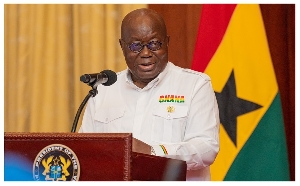- Home - Entertainment
- Lifestyle News
- Entertainment Videos | TV
- Year In Review
- Music News
- Entertainers
- Entertainment Archive
- Entertainment Photos
- Jokes
- Entertainment Headlines
- Ameyaw Debrah
- Brown GH
- Celebrities Buzz
- GH Base
- Ghana Celebrities
- Gh Gossip
- GH Page
- GH Splash
- Hot Gossip GH
- YEN

General News of Wednesday, 1 September 1999
Source: GNA
GWCL to install more meters
Accra, Aug. 31, GNA - The Ghana Water Company Limited (GWCL) is to buy 40,000 metres and install them in Accra, Kumasi and Takoradi to cut down on unaccounted-for-water. The fixing of metres in the three metropolitan areas, which has the greatest number of customers would build confidence in the billing system.
Mr Charles Adjei, Managing Director of GWCL, said this when representatives of Chartered Institute of Marketing, Ghana (CIMG) called on him to discuss problems the company was facing with a view to formulating marketing strategies to solve them.
The visit also enabled GWCL to explore the possibility of joining CIMG for effective interaction with the institute. Mr Adjei said illegal connections amount to about seven per cent of the total production of the company, thus many residential areas in urban centres are deprived of potable water.
He said the company is managing the distribution in such a way that every consumer gets a fair share. "If by the year 2004, water production is not increased especially in Accra and Tema, there is bound to be crisis and this could affect the economy and drive away investors".
To prevent this, the Weija Water Works is being rehabilitated to improve supply to Accra West to 15 million gallons a day. Mr Adjei said communities are managing small water supply systems in rural areas thereby leaving the company to concentrate on the urban centres.
He quoted a WHO report, which said about 80 per cent of all diseases are water borne and said there was the need to speed up the expansion of potable water delivery. He said the company would come up with pre-payment metering, by the end of the year to reduce the incidence of mistrust. The system is currently being tried on pilot basis.
Mr Harrison Kofi Abutiate, President of CIMG, said the objective of the Institute is to prepare the market for corporate members and to make them more market oriented.
He suggested the frequent education of the public especially those farming along riverbanks to desist from such acts to prevent the pollution of water bodies.










